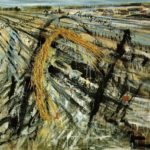Your Golden Hair, Margarete, 1980
Anselm Kiefer (German, born 1945)
Watercolor, gouache, and acrylic on paper
Celan’s “Death Fugue,” widely read and anthologized in postwar Germany, is set in an extermination camp. Its narrative voice, in the first person plural, is that of the camp’s Jewish inmates who suffer under the strict watch of the camp’s blue-eyed commandant. Singing “your golden hair, Margarete / your ashen hair, Shulamith,” the narrators contrast German womanhood, as personified by Margarete, to whom the commandant addresses letters at night (she is named after Goethe’s heroine, Gretchen, in Faust), and Jewish womanhood (Shulamith was King Solomon’s dark-haired beloved in the Song of Songs). Here, as in most of Kiefer’s Margarete works, the German heroine is depicted only by the synecdoche of her “golden hair,” in the form of sheaves of wheat in the countryside.
Note: The Google Art Project offers high resolution views of three additional artworks by Anselm Kiefer. You can access them by clicking here. (Be sure to try out Google’s zoom function so that you can examine the artworks’ astonishing details!) Two of these paintings are held by the Art Gallery of New South Wales, and the other can be found in The Toledo Museum of Art.
In honor of Yom HaShoah (Holocaust Remembrance Day) and as part of our ongoing National Poetry Month series, we now turn to the chilling poem that inspired the above work of art.
Paul Celan (born Paul Antschel) was a Holocaust survivor who wrote in German and whose work has had a strong influence on both poetry and the visual arts in postwar Europe. The poem “Death Fugue” is sometimes cited in the ongoing debates around Theodor Adorno’s famously quoted (and often misquoted) comment that it is “barbaric” to write poetry after Auschwitz.
Death Fugue
by Paul Celan
translated by Jerome Rothenberg
Black milk of morning we drink you at dusk
we drink you at noontime and dawn we drink you at night
we drink and drink
we scoop out a grave in the sky where it’s roomy to lie
There’s a man in this house who cultivates snakes and who writes
who writes when it’s nightfall nach Deutschland your golden hair Margareta
he writes it and walks from the house and the stars all start flashing he whistles his dogs to draw near
whistles his Jews to appear starts us scooping a grave out of sand
he commands us to play for the dance
Black milk of morning we drink you at night
we drink you at dawn and noontime we drink you at dusk
we drink and drink
There’s a man in this house who cultivates snakes and who writes
who writes when it’s nightfall nach Deutschland your golden hair Margareta
your ashen hair Shulamite we scoop out a grave in the sky where it’s roomy to lie
He calls jab it deep in the soil you lot there you other men sing and play
he tugs at the sword in his belt he swings it his eyes are blue
jab your spades deeper you men you other men you others play up again for the dance
Black milk of morning we drink you at night
we drink you at noontime and dawntime we drink you at dusktime
we drink and drink
there’s a man in this house your golden hair Margareta
your ashen hair Shulamite he cultivates snakes
He calls play that death thing more sweetly Death is a gang-boss aus Deutschland
he calls scrape that fiddle more darkly then hover like smoke in the air
then scoop out a grave in the clouds where it’s roomy to lie
Black milk of morning we drink you at night
we drink you at noontime Death is a gang-boss aus Deutschland
we drink you at dusktime and dawntime we drink and drink
Death is a gang-boss aus Deutschland his eye is blue
he shoots you with leaden bullets his aim is true
there’s a man in this house your golden hair Margareta
he sets his dogs on our trail he gives us a grave in the sky
he cultivates snakes and he dreams Death is a gang-boss aus Deutschland
your golden hair Margareta
your ashen hair Shulamite
–
You can read more about Paul Celan’s life and work by clicking here.
Submitted by Renate Evers, David Brown and Michael Simonson, Leo Baeck Institute.

